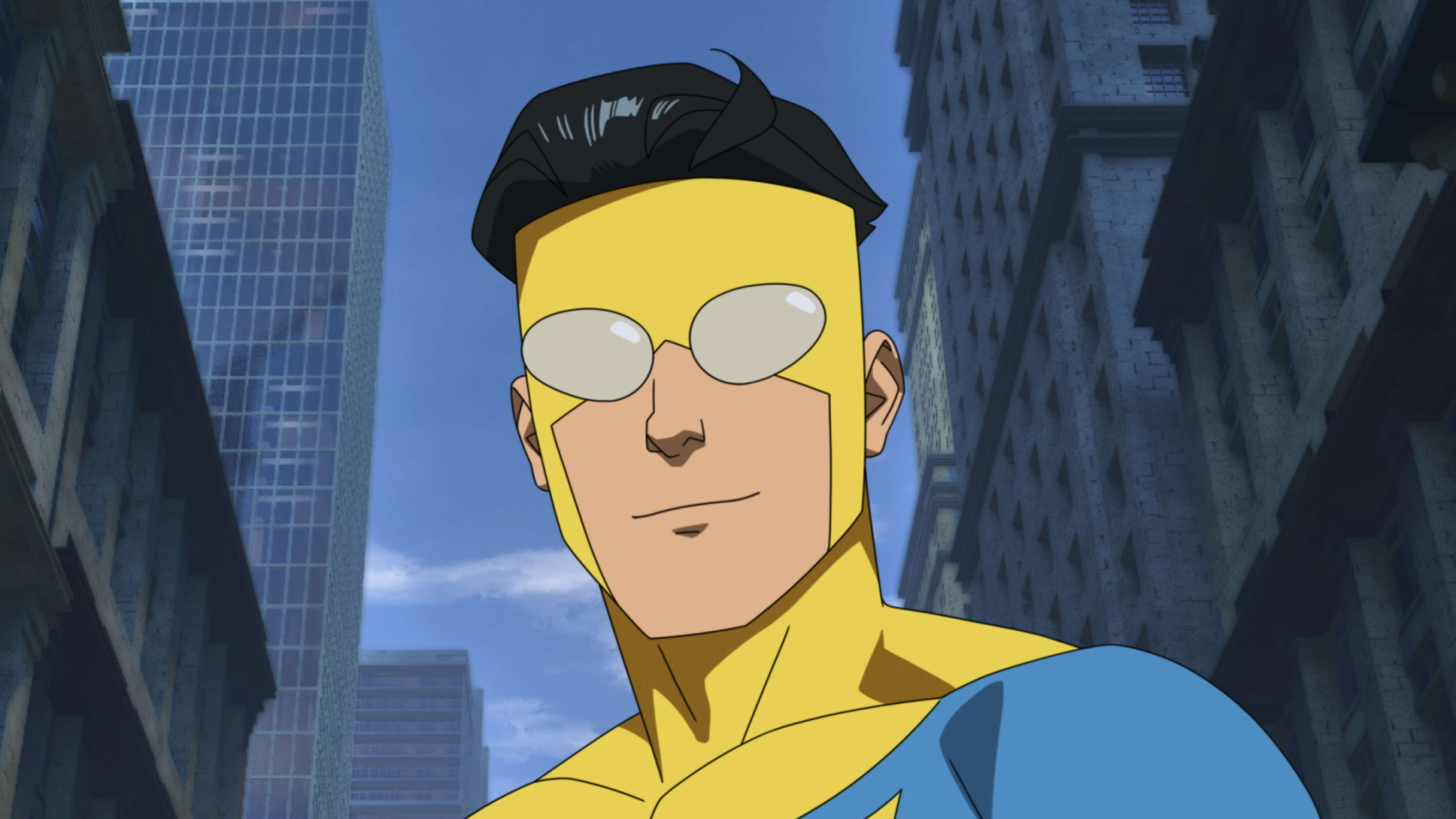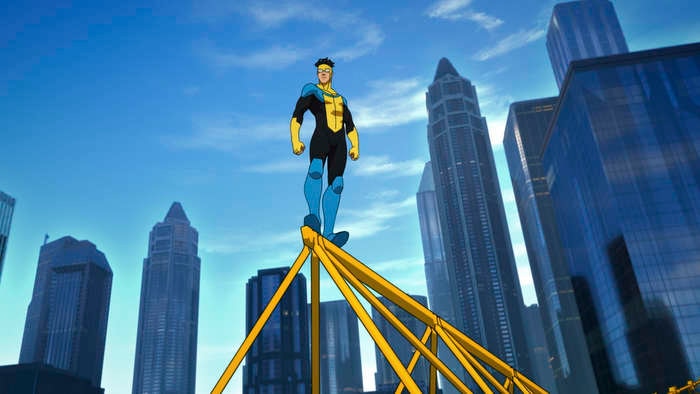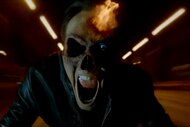Create a free profile to get unlimited access to exclusive videos, sweepstakes, and more!
Robert Kirkman's 'true adaptation' of Invincible aims to change superheroes like The Walking Dead did for zombies

Robert Kirkman may have earned his superstar writing cred for creating The Walking Dead comic and then the eponymous AMC television series, but there was another of his comics titles that put him on the map with superhero appreciation circles: Invincible.
Created with artist Corey Walker in 2003 for Image Comics, Invincible kicked off a brand-new superhero imprint with the indie publisher and it immediately drew gasps from readers and critics alike for its ultra-violent depiction of traditional, cape-centric superhero stories. The book was both a coming-of-age story about 17-year-old Mark Grayson finally presenting (and figuring out) his powers, and a deconstruction of the most cliched tropes of this specific genre, in a similar vein to work from writers like Alan Moore (Watchmen) and Frank Miller (The Dark Knight Returns).
However, Invincible was drawn in the sunny, vibrant style of all-age comics and Saturday morning cartoons, making for a bigger punch when readers watched the blood splatter explode on the pages.
In development for adaptation for almost two decades, Invincible is now an animated Amazon Prime Original series debuting March 26, with Kirkman writing and executive producing alongside Simon Racioppa. SYFY WIRE got on the phone to ask Kirkman about how this show will compete in a very superhero saturated market, how the violence in the book translates to the screen, and the lessons learned from the success of The Walking Dead adaptation that may have influenced this series.
**Some spoilers about the tone and content of the Invincible comic book. Don't read further if you want to be surprised about the adaptation.**
Back when Invincible first came out, it read like a love letter to superhero comics, just with actual visceral repercussions for the powers possessed by the characters. How would you characterize the flavor of this adaptation?
I think that flavor is that it is very much a traditional superhero story. It doesn't strive to say that we're elevated from the superhero genre, or we're somehow a superhero story that's better than other superhero stories.
Knowing that, do you expect audiences not familiar with the book to be shocked (anew) by the very cartoony style of this animated series?
Invincible is a story that uses everyone's awareness [of] traditional superhero storytelling tropes in order to tell a compelling story. There's a foundational awareness that you have to have when you come into Invincible. And when the comic book series debuted in 2003, that foundation was built on decades and decades of reading DC superhero series, as well as other comics. I've kind of set the stage for what came from a comic.
A lot of people who may watch Amazon's very adult adaptation of Garth Ennis and Darick Robertson's The Boys might think Invincible is following in that show's footsteps. But your book beat The Boys to shelves by three years. Is it a bit frustrating that adaptation got to screens first?
You know, The Boys did leapfrog us in a way and that's great. I think that The Boys having the success that it has had at Amazon has really paved the way for priming — if you can forgive the bad play on words — the audience to experience Invincible because once you're on board with The Boys, I think it's a very easy transition into Invincible. It also allowed Amazon to see just how massive audiences are out there for this kind of content. It's gotten the platform behind us in a big way, which is very exciting. And we're very thankful that they're putting so much muscle behind our show.
But, more than anything, we have a very, very savvy, superhero-literate audience that exists in this world today. And Invincible is going to be able to trick them into thinking certain things are going to happen in this show that absolutely do not happen in this show. We wouldn't be able to do that if the audience wasn't so superhero-literate. So it's really a great time for the show to exist. And I think it's going to have a lot of impact because of that.
Let's talk about the violence portrayed in the series. Why frame it the way you do in the show?
If you look at this realistically, we have superheroes that have different skillsets and different power levels, who are going to be operating on different levels that are interacting with each other. So if a superhero that has a lower power level fights a superhero that has a higher power level, and they don't really know what those differences are, there's going to be some severe injuries.
Having arguably opened up mainstream TV to horror and violent storytelling with The Walking Dead, did that show's success help you dial in your bar for Invincible's extremes?
Much like The Walking Dead, all the extreme violence that we see is all about having emotional impact, serving character investment, and making you feel the pain of these characters in this world. And this was very much the same. That's the dramatic core of what we're trying to do.
And we're not shying away from anything at all. This is, in many ways, a much more intense, much more violent story than The Walking Dead because the scope and scale is so off the charts compared to The Walking Dead.
In regards to other lessons learned as a writer on the AMC series, did it change you as a storyteller and writer in ways that directly impacted this adaptation?
When I came on The Walking Dead, I didn't understand writing dialogue for live-action versus writing dialogue that was going to sit on a page and actually be seen and read in text form. I also had to learn how to utilize sound and motion in a way that wasn't used by someone who had predominantly only written comics.
And Invincible is essentially a cable drama, right? It's an hour-long format. And so there isn't a tremendous amount of story that you can tell in comics when you have complicated action or if you have involved dialogue scenes. Text takes up space, and action has to have a panel that represents each movement and transition for it to actually be read and followed well. Those things can fill up a lot of space in a comic book, but they can be handled very quickly and accomplish the same thing in animation. That gives us the opportunity to tell a tremendous amount of story in each one of our episodes. Figuring out the balance of that, and figuring out what it is that we can actually accomplish in an episode, that's always been a learning curve. And it's something that I'll probably never actually master, but I'm getting more of a handle on it.
And Invincible has allowed us to bring the comic book to life in a way that is a little bit more complete. With The Walking Dead, we were only at issue 70 of the comic book series. But when we started Invincible, the [comic] series had reached its conclusion, so it's a little bit more of a true adaptation, or slightly more faithful, although not exactly. We were able to see the landscape in its entirety, and reconstruct that with a full awareness of what's coming.
Will you have more fealty to the Invincible comic arcs and stories then, or will original material be part of this too?
There are going to be certain things in Invincible that we build to in a more complete way, or in a more exciting way. There are certain things that we move up because we know that there's extra things after that we can handle.
When Simon and I sat down to map out the season, it was very much a process of, "Here is the starting point issue and here's the ending point issue and this is the final moment of the season. And we're going to build to that moment the same way we did my comic, but we're going to change it here, here, here, here and here." But at the same time, there are other elements from the series that are pulled in, so we're rearranging things a little bit. There's some slight editing going on here, so if you're a fan of the comic books, you're gonna get a lot more than you may expect.
The visual style of the show is really the conduit to surprise, especially for new audiences. It looks like a high production value, afternoon superhero show so expectations get flipped. What was integral to remain visually from the books to screen?
Cory Walker, who is the lead character designer [for the comics and show], he's changing and tweaking things and making things better. When he started drawing the comic book almost 18 years ago, he was 22 years old. He's a much more talented, skilled artist at this point. He's definitely not going to be looking back at his work saying, "Oh, yeah, I can't improve on this." [Laughs.]
Everyone involved in the process is heightening everything that's there. The comic book provides us with a very strong foundation, but we would be foolish not to take our talents that are available to us to build upon that foundation.
You scored your former The Walking Dead star and current Academy Award nominee Steven Yeun as the voice of Mark Grayson. Was he always your first choice?
Well, I'd been watching a lot of Voltron [Legendary Defender (2016)] and he's absolutely great in that. And the thing that was really fantastic was he didn't seem like himself, which is something that I'm always looking for in an actor. Especially for somebody I know. And I know Steven very well. I've known him for years at this point, so anytime I see something he's in, and I'm like, "I don't know who that guy is," that impresses me.
And then when he came in for his first record session, he started doing the voice. And I was like, "Wait a minute, that's not the voice from Voltron!" He was like, "Yeah, I'm trying to play this guy younger and more naive." And I was like, "But wait, it comes through in literally every word you say. How do you do that?" He put his hand under his chin, and was like, "Acting."
He's one of the most impressive guys and I can't gush enough.
With this TV adaptation out, does that mean the movie version of Invincible is on hold?
The movie version with Seth [Rogen] and Evan [Goldberg] is still very much in development. We're doing the animated series at the same time, and that process might have enabled us to secure Seth Rogen as the voice for Alan the Alien for this [show] a little bit easier than it may have otherwise been. But yeah, it's taken a while and that is unfortunate, but the movie at Universal is still very much in play, and is now completely separate from this spectacular Amazon series that we're all very excited about.
Invincible premieres on Amazon on March 26.


























